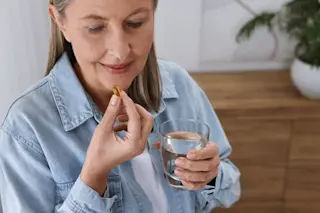The trick to keeping organs working well into old age might be taking out the trash, according to a study in Nature Medicine [subscription required]. Researchers led by Ana Maria Cuervo of Yeshiva University in New York have slowed the aging process in the livers of mice by tinkering with a system that recycles the damaged proteins hanging around in a cell. Molecules responsible for "chaperone-mediated autophagy"
handle about 30 percent of the cells' damaged proteins, escorting them to inner cell structures called lysosomes, where enzymes break the proteins down. Studies by Cuervo have shown that the disposal system becomes less efficient as cells grow older. They've also pinpointed the reason for the age-related decline -- a loss of receptors on the surface of the lysosomes that causes a buildup of damaged proteins in the cell
[U.S. News & World Report]. To see whether they could keep the protein recycling ...













